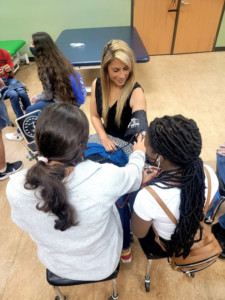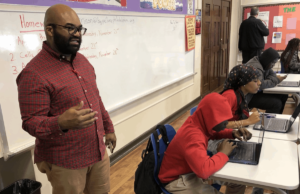Interview: Chad Ratliff, Albermarle County Public Schools
If you could have the ear of any award-winning or famous education reformer, dead or alive, who would it be and what would you ask him or her?
Excellent question. It’s easy to talk about what needs to be fixed in public education. It’s much, much harder to actually do it. “Famous” ed reformers get that way because they invest a significant amount of time in writing, speaking, researching, and other vehicles of thought leadership.
They’re theorists and analysts who are reforming how we think about educational practice and policy. That’s fine; we need them.
But, there are reformers in classrooms, school buildings, and, yes, even central offices who are real-time change-makers redesigning education from the inside out. They typically don’t become famous, frankly, because they’re too busy reforming. I like talking to them and learning how they pull it off. That’s what I want to scale.
Mainstream press and white paper researchers for education are pointing out that budget cuts for education are going to be more and more drastic, especially into late next year and on. What needs to happen on the local level to address these cuts?
Locally, education funding always lags behind the real estate market, so we’re not out of the woods until the market bottoms. The Obama administration is pushing initiatives to expedite this, but it will take a wave of first-time home buyers and real estate investors. Problem is, rising unemployment and a weak economy cripples the first-time home buyer demographic, and many investors are either still stinging from the collapse or were part of it. Hopefully, the REIT sector can pick up the slack. In the meantime, it’s either raising property taxes or decreasing services. It boils down to the community’s priorities.
What room is there for innovation in education spending and in school management that could change the way money is spent on education in Virginia?
School divisions are going lean, but lean thinking shouldn’t be about basic cost-cutting techniques. That’s what accountants do. Educational leaders must use this opportunity to shift organizational culture, focusing on the future, not the past. For instance, we can leverage open source online learning resources instead of textbooks, invest in efficiency technologies like GPS systems on buses to reduce transportation costs, and allow students to use personally-owned technology in classrooms, which also helps narrow the digital divide. That’s just the beginning. Also, it’s important to ensure funding for R&D remains in place, or seek outside revenue streams to support this work. Otherwise, we’ll just perpetuate the status quo. Competitive grant programs are a step in the right direction, but they can only be as good as the models judges want to see scaled.
You recently wrote about start-up funding models on your blog. Where are you going with that? What does that look like in public education, if there is a place for it?
Definitely a place in public education for it. Know any venture philanthropists looking to invest?
Can you explain the difference between “making money” and entrepreneurship in schools?
Some entrepreneurs are interested in making money, others are interested in making a social impact, and still others are interested in both. At its core, though, entrepreneurship is the art of seeing problems as opportunities and putting ideas into practice to address them.
Entrepreneurs are willing to be held accountable for the inherent risks and outcomes of idea implementation.
The risks could be financial, personal, or professional.
For example, in schools the entrepreneurial teacher risks instructional time, test scores, and his or her own evaluation for every innovative strategy they try to implement. These risks broaden and become increasingly financial in nature all the way to the superintendent and school board. The current educational model is not well designed for innovation. Risk soars as room for error decreases, and the one-two punch of high-stakes testing and hyper-accountability are exacerbating this problem. I’m all for accountability, but we need to re-examine what we should be holding educators accountable for. Let’s identify the innovators, finance them, and let them run. It’s naïve to assume educational entrepreneurs must come from outside the system. I talk to educational entrepreneurs daily, but most don’t even realize that’s what they are.
Can you provide an example of a good sustainability model for education that uses tech and innovation?
Educators have been giving away intellectual property and providing free R&D to the private sector for many years. Somebody packages it up and sells it right back to us. We should be doing that ourselves. We should be lifting and supporting our own colleagues professionally and financially. That’s an innovation in and of itself. It could come by way of curriculum design, creating flex-books, online course development, and so on.
We also need stop holding so many teacher-turned-bloggers in such high regard and recognize marketing disguised as expertise when we see it — we can just as easily bring in professional educators to do professional development.
Ok, so, I guess that’s not exactly using tech and innovation for sustainability, but it is incredibly annoying.







0 Comments
Leave a Comment
Your email address will not be published. All fields are required.